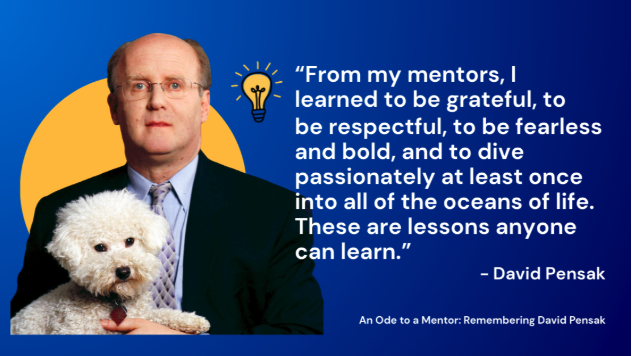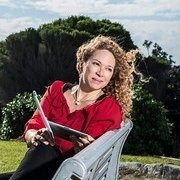An Ode to a Mentor: Remembering David Pensak

First Encounters
Some mentors change the way you think. A rare few change the way you see yourself, your work, and even the future you’re building. For Michael T. McDonald and I, that person was David Pensak.
I first encountered David in 2012 when I interviewed him for my book Innovation: How Innovators Think, Act and Change Our World. At the time, I already knew he was extraordinary: a scientist, innovator, and entrepreneur who quite literally changed the world when he created the first commercially successful firewall. But what struck me most wasn’t his résumé — it was the way he thought, and the way he made others think.
From the first conversation, I knew that when the time came to form a “Brains Trust” advisory board for our company, he would be the first person I asked. I hung up the call, turned to Michael, and said, “That’s the guy.” Four years later, in 2016, we asked — and he said yes. From then until his passing in August 2022, we spoke virtually every week.
A Masterclass in Genius and Humour
Yes, David was a genius — the kind who saw inherent security problems in the early internet and solved them in ways the “experts” swore were impossible. He was also a polymath: exploring geothermal power in Jordan, developing fireproof yet silk-light fabrics, extending water purification systems to disadvantaged areas. He embodied restless curiosity and relentless invention.
His work laid foundations that shaped entire fields — particularly cybersecurity, where his innovations still underpin the way networks are protected today. In an industry often obsessed with the next buzzword, David’s contributions remain timeless: practical, principled, and profoundly influential.
But brilliance was only part of who he was. He was also a master storyteller, an attentive listener, and, famously, a teller of “David jokes” — which were legendary. One favourite: he would insist, with absolute deadpan, that he was addicted to his wonderful wife — “she’s my heroine.” Cue groans and laughter every time. It became a ritual, one that grounded even our most serious discussions with humour and warmth.
His stories could carry you from the technical intricacies of network security to the surreal delight of meeting Albert Einstein as a child. That ability to bridge awe-inspiring genius with down-to-earth humour made him not just brilliant, but beloved.
Generosity of Spirit
What made his mentorship so extraordinary, though, was his generosity of spirit. He never talked about whether he would make a fortune from our success. Instead, he focused on how we could. He believed our technology could become globally ubiquitous — and, more importantly, he believed in us. He pushed us to think bigger: why not demonstrate to world and industry leaders? Why not see ourselves as thought leaders rather than automatically deferring to someone else?
His advice often cut straight to the heart of things. He helped us clarify what problem we were really solving. He showed us that relationships didn’t have to be transactional — that you could simply help people because it was the right thing to do, without expecting a “clip of the ticket.” That generosity shaped how Michael and I have built our company and our networks.
Innovation Without Walls
Looking back, I see how deeply his philosophy of innovation — captured in that very first interview and throughout his writings — threaded through his mentorship. As David wrote in his book Innovation for Underdogs: How to Make the Leap from What If to Now What:
“So many people believe that truly innovative scientists accomplish so much by locking themselves up in their laboratories all day long… In fact, innovation involves drawing from every stretch of the planet, bringing technology or processes from one part of life to change the nature of another.”
That was David in action: relentlessly curious, always connecting ideas across boundaries, always encouraging us to think in ways that felt both daring and possible. He reminded us constantly not to shrink our vision to fit someone else’s definition of “possible.”
He also believed that innovation required permission — not from an authority figure, but from ourselves. To innovate meant daring to go “where no one has gone before,” without fear of being punished if the outcome wasn’t a commercial hit. For him, failure wasn’t the opposite of innovation; fear was.
He also had no patience for the now-fashionable ‘fail fast’ mantra. To David, there was nothing noble in failing fast if you were actually creating something meaningful. Innovation, he believed, deserved persistence, resilience, and respect — not a culture of throwing half-baked ideas at the wall to see what stuck.
Innovation as Altruism
David’s innovations were never just about commercial gain — they were about solving problems and lifting others up. His famous firewall was born not from a quest for fortune but from a desire to help a friend stave off bankruptcy. He extended water purification systems developed in academia so that disadvantaged regions without surplus power could have clean water. He worked on fabrics that were light as silk but fireproof and waterproof, designed to save lives in construction, medicine, and safety.
This altruistic streak shaped how he viewed success — and, by extension, how he encouraged us to think about our own path. He didn’t measure success by dollars alone but by impact, reach, and the ability to change lives. He believed that innovation should leave the world better than it was found — a conviction that continues to guide how Michael and I think about building technology today.
Learning From Giants
David never pretended he achieved greatness alone. In Innovation for Underdogs, he paid tribute to those who shaped him, writing:
“Thank you to all of my mentors and teachers. You may not have known at the time what you were teaching an impressionable young boy, but the time and effort you spent helping to guide me is what motivates me to try and get you the immortality you so richly deserve.”
Among those mentors were Albert Einstein, who encouraged a young David to be audacious in his curiosity; Professor Corey at Harvard, who showed him the value of persistence and boldness in discovery; and the many brilliant scientists he observed collaborating to unlock one another’s genius. From them, David learned that innovation is never solitary, that teamwork magnifies insight, and that intellectual generosity is as powerful as intellect itself.
As he also wrote:
“From my mentors, I learned to be grateful, to be respectful, to be fearless and bold, and to dive passionately at least once into all of the oceans of life. These are lessons anyone can learn.”
Those lessons became the foundation of his mentorship style: generous, open-minded, challenging in the best way, and always laced with humour.
Transformative Lessons
For Michael and I, David’s mentorship was transformative. His feedback helped us sharpen our focus, identify the true problem we were solving, and recognise that we deserved a seat at the table with serious players. He taught us to see ourselves not just as technologists but as leaders.
Perhaps most importantly, he modelled what it looked like to be successful without becoming transactional. To help because it was right. To dream audaciously. To be generous with your time, your wisdom, and your laughter.
Passing the Torch
As we mark the anniversary of David’s passing, it feels right to also reflect on the launch of the next cohort of the Cybersecurity Advisors Network (CyAN) Mentorship Programme. David embodied everything I believe mentorship should be. The greatest way I can honour his memory is by paying forward what he gave me — offering the same kind of encouragement, honesty, and belief to those coming up the ladder today.
Mentorship, at its best, isn’t about gatekeeping knowledge or building someone in your own image. It’s about unlocking possibilities in others, helping them see what they can become, and giving them the courage to go where no one has gone before. David showed me that, week after week, year after year.
A Legacy That Lives On
I miss him — his stories, his puns, his conviction that Michael and I could change the world with our ideas. But his legacy lives on every time I choose to mentor someone else, every time I remind myself to think audaciously, and every time I laugh at a corny pun.
For anyone who wants to hear more of David’s voice directly, his book Innovation for Underdogs: How to Make the Leap from What If to Now What captures not just his philosophy on innovation, but his generosity of spirit. It remains as relevant today as the man himself was during every conversation.
Here’s to you, David. Thank you for the gift of your mentorship — in fact, thanks for everything!
About the Author:

Kim Chandler McDonald is the Co-Founder and CEO of 3 Steps Data, driving data/digital governance solutions.
She is the Global VP of CyAN, an award-winning author, storyteller, and advocate for cybersecurity, digital sovereignty, compliance, governance, and end-user empowerment.